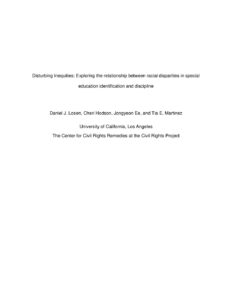Abstract
Advocates call for schools with high suspension rates to receive technical assistance in adopting “proven-effective” systematic supports. Such supports include teacher professional development. This call is justified given evidence that good teaching matters. But what types of professional development should be funded? Increasingly, research points to the promise of programs that are sustained, rigorous, and focused on teachers’ interactions with students. The current study tests whether a professional development program with these three characteristics helped change teachers’ use of exclusionary discipline practices—especially with their African American students. Exclusionary discipline is when a classroom teacher sends a student to the administrators’ office for perceived misbehavior. Administrators then typically assign a consequence, usually in the form of suspension (in-school or out-of school). The My Teaching Partner-Secondary (MTP-S) aims to improve teachers’ interactions with their students when implementing instruction and managing behavior. MTP-S helps teachers offer clear routines, implement consistent rules, and monitor behavior in a proactive way. The program also supports teachers in developing warm, respectful relationships that recognize students’ needs for autonomy and leadership. Teachers are paired with a coach for an entire school year (sustained approach), they regularly reflect on videorecordings of their classroom instruction and carefully observe how they interact with students (approach focused on interactions), and they apply the validated Classroom Assessment Scoring System (CLASS-S) to improve the quality of their interactions (rigorous approach). In the current study, a randomized controlled trial found that teachers receiving MTP-S relied less on exclusionary discipline with all of their students compared to the control teachers. Furthermore, the program was the most beneficial for teachers’ reduction of exclusionary discipline with African American students. This is the first study to show that programs like MTP-S that focus on teacher-student interactions in a sustained manner using a rigorous approach can actually reduce the disproportionate use of exclusionary discipline with African American students. More broadly, the findings offer policymakers direction in identifying types of professional development programs that have promise for reducing the racial discipline gap.
Acknowledgements: This study and its write-up were supported by a grant from the Institute of Education Sciences (R305A100367). The views in this article do not necessarily reflect policies or recommendations of the funding agencies. The authors are grateful for the teachers and students who participated in this study and the many staff who contributed to this project, including Judith Wasserman, Sharon Deal, Marla Capper, and Kathy Neesen.
In compliance with the UC Open Access Policy, this report has been made available on eScholarship:
